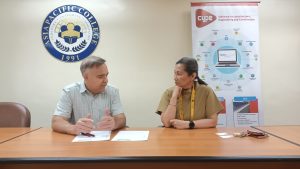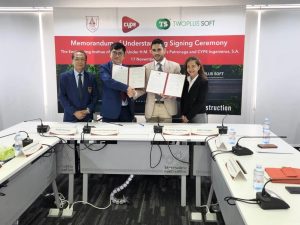This year, the School of Mining and Industrial Engineering of Almadén (EIMIA) from the Universidad de Castilla-La Mancha (UCLM) has awarded CYPE a "Special prize as a collaborating company", for the excellent relationship they have maintained for more than two decades, which has allowed them to train students at the school.
Carlos Fernández, CYPE's technical director, was presented with this award during the ceremony during which diplomas were awarded to the 5th graduating class of the EIMIA.
Among the many initiatives carried out by EIMIA and CYPE in recent years, it is worth highlighting the continuous holding of courses and internships with the aim of training EIMIA students in the most professional environment possible. It is also worth mentioning the signing of different agreements that allow both EIMIA teachers and students to use CYPE software free of charge and to keep up to date with the latest developments in the technical software sector as well as those in CYPE.
Carlos Fernández stated, "This award is particularly important to us because of the history of the School that has awarded it to us, since it was the first one to be founded in Spain and the third in Europe in the field of Mining Engineering, and because of the recognition of the excellent collaboration that CYPE and EIMIA have maintained for more than two decades".
Almadén School of Mining and Industrial Engineering: History
The Almadén School of Mining and Industrial Engineering (EIMIA) was founded during the reign of Charles III in 1777, with the first studies of Underground Geometry and Mineralurgy directed by Mr Enrique Cristóbal Störr, at that time director of the Almadén Mines, undoubtedly taking advantage of the progress and technical solera of the Almadén mining area. It was initially called the Mining Academy, the third oldest in Europe, the first two having been created ten years earlier in Freiberg (Saxony) and the Russian Academy in St. Petersburg in 1775.
Throughout its educational trajectory and as a centre of international reference, the institution has trained outstanding teachers and students such as Fausto Elhuyar, discoverer of wolfram, and Andrés Manuel del Río, discoverer of vanadium, who implemented the most modern mining methods of that time in the New World.





